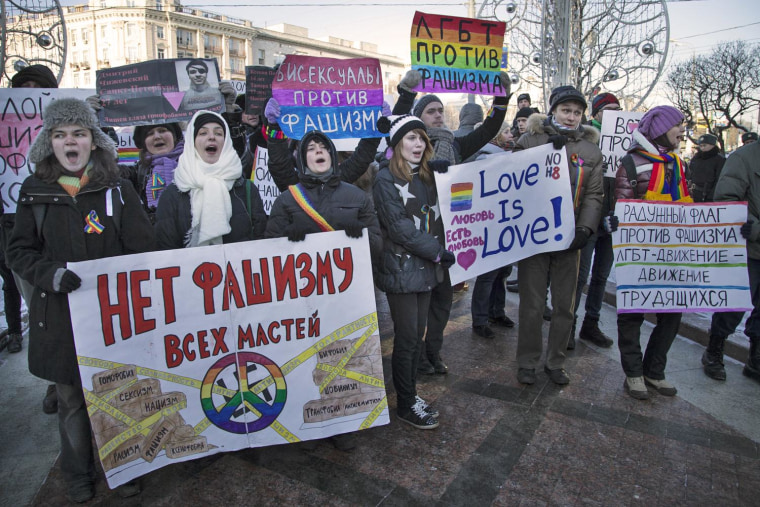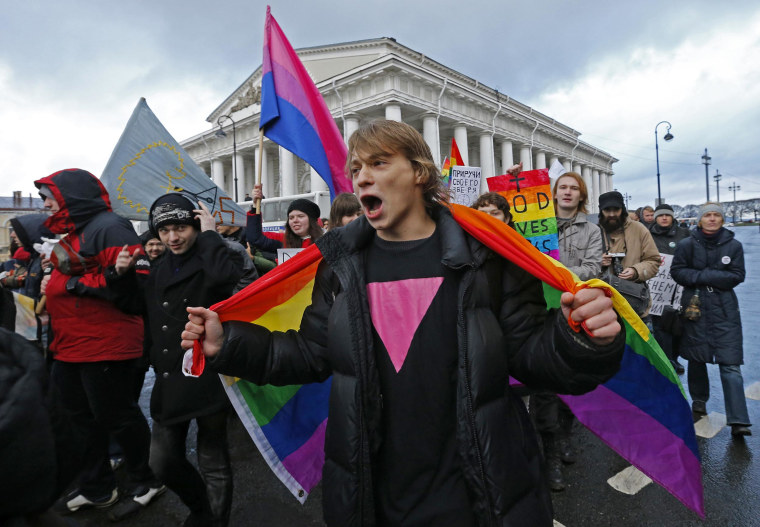The Sochi Olympics present a unique chance for gay rights organizations to call attention to anti-gay laws passed under President Vladimir Putin, most notably one that criminalized the promotion of “non-traditional sexual relations.”
But seizing the spotlight in Russia when the world fixes its attention there next month also poses a tricky set of challenges — limited visas, little official cooperation from Olympic delegations and concern for the physical security of gay rights activists.
So for the most part, gay rights groups will focus their energy elsewhere, staging events around the world and using social media to get the word out about what they describe as the systematic oppression of Russian gays and lesbians.
'Sochi in many ways is the beginning of a new chapter in the LGBT movement, and our work is to educate people at home.'
“I think what’s most important is to really stay focused on true solidarity beyond Sochi,” said Julie Dorf, a senior adviser at the Council for Global Equality, an American group that concentrates on treatment of gays around the world.
“Sochi in many ways is the beginning of a new chapter in the LGBT movement, and our work is to educate people at home,” she said.
Plans in place
The Human Rights Campaign, the largest gay advocacy group in the United States, will not send staff to Russia for the games — a spokesman cited concerns about security and visa availability — but will use social media to promote an initiative called Love Conquers Hate.
The group sells T-shirts with the message printed in Russian, and says it has already used the proceeds to donate $100,000 to gay groups in Russia.
The last two Olympics, in Vancouver in 2010 and in London in 2012, featured so-called pride houses — unofficial but prominent spaces where gay athletes and fans could celebrate and watch Olympic competition.
The Russian government scuttled the idea for Sochi, so another organization is putting together what it is calling remote pride houses, including in the Olympic cities of Atlanta and Los Angeles, for celebrations and, in some places, protest rallies.
Marc Naimark, a vice president for the Federation of Gay Games and a member of the group Pride House International, said Olympic organizers could have pushed harder for inclusion.
“For their own reasons, which I think are sincere but misguided, they chose to keep on the tack that this is all about politics,” he said. “We think this is fundamentally about sport. Sport is about competing on a level playing field.”
Concern for protesters
Homosexuality itself was decriminalized in Russia in 1993. But Russia passed a law last year banning what it called the promotion of homosexuality to minors, and it sharply restricted adoption of Russian children by international gay couples.
In addition, human rights groups have described a pattern of violence against gays and lesbians in Russia, including public humiliation and videotaped beatings that have been distributed online. Last week, a Russian protester was detained for unfurling a rainbow flag during the Olympic torch relay.
Putin said earlier this month that gay athletes and fans should feel welcome at the Sochi Games, which open Feb. 7, but that they should “leave the children in peace.”
Russia has also designated an area for protests during the games, but it is in a coastal town seven miles from the nearest Olympic venue, and rights groups worry about what will happen after the games to Russian citizens who have demonstrated there.

Difficult line for athletes
The International Olympic Committee has said it has no grounds to challenge the Russian laws, and Rule 50 of the Olympic charter bars athletes from taking part in any political demonstration at the games.
With the Olympic rules in mind, Hudson Taylor, an ex-wrestler who founded a group called Athlete Ally that aims to end homophobia in sports, says he will travel to Sochi. His idea: Use a direct quote from the same Olympic charter to promote the message.
Principle 6 of the charter says that discrimination based on “race, religion, politics, gender or otherwise” is incompatible with Olympic ideals. Taylor hopes to get Olympic athletes to say simply on social media that they support Principle 6.
“There are some flexibilities on social media, but there’s still a line that athletes need to walk,” he said in an interview. “If we’re looking at positive change, the best way to do that is to speak to the heart and the identity of what the Olympics should stand for.”
Athlete Ally has partnered with the gay rights organization All Out and with American Apparel, the clothing store, to sell bright-red T-shirts promoting the language of Principle 6 — but that carefully avoid the Olympics name and logo.
The U.S. Olympic Committee says it has been assured by the IOC that “the anti-LGBT laws will not directly impact the Games,” and it has publicly opposed the legislation as inconsistent with Olympic principles.
USOC officials have said they won’t muzzle the American athletes, but they have also said that their top priority is safety, and have warned them about potential consequences — with the IOC and Russian authorities — if they go too far.
Taylor, from Athlete Ally, said that he might visit the official protest zone, and he echoed the concern about what will happen to Russian protesters after the Olympic torch is extinguished.
“There’s a wonderful opportunity to raise awareness and change minds at Sochi. These laws are still going to be in place after the games conclude,” he said. “My job in Sochi is to push that line to the extent that is safe and possible.”
